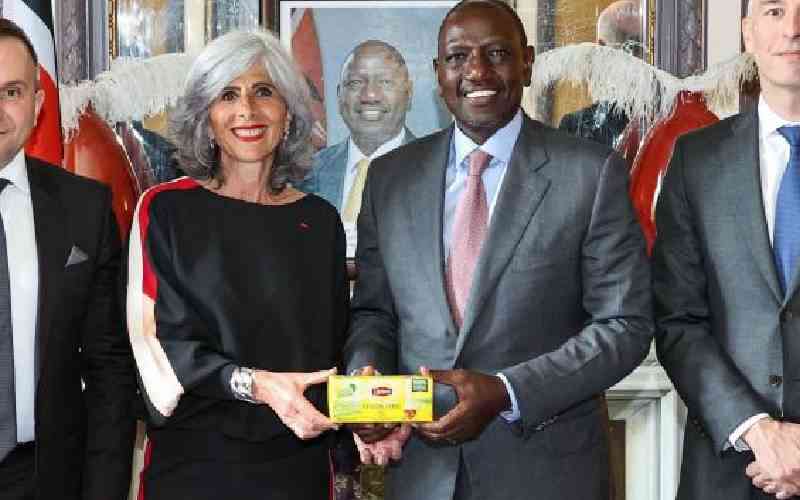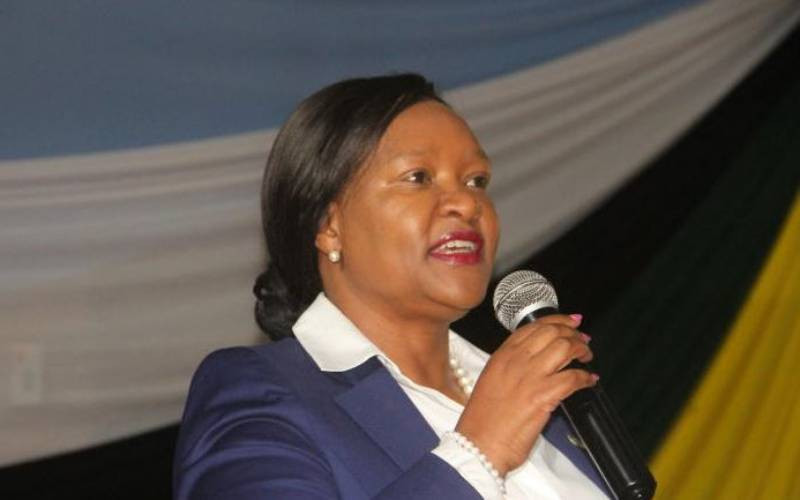By Martin Mutua
The Judiciary was effectively roped into the war of supremacy between Parliament and the Executive over the reappointment of Justice Aaron Ringera as the anti-graft czar.
And the House lived up to its newfound assertiveness — two committees tabled a report overruling President Kibaki’s Gazette notice, terming it as null and void. |
Justice Aaron Ringera |
But the Executive — visibly thrown off balance — fought back through Justice Minister Mutula Kilonzo, who sought to have the House halt debate over the sub judice rule, claiming the matter was already before court.
His move elicited sharp reactions from the front Bench, with Cabinet ministers breaking rank and delivering dissenting arguments. The Speaker will rule on the matter tomorrow.
Trouble began soon after Speaker Kenneth Marende issued a lengthy communication from the Chair on whether or not a departmental committee of the House had mandate to deal with the matter or not.
Marende ruled that it was not his business to pronounce whether the Ringera’s re-appointment constituted subsidiary legislation or not, as per the Standing Orders.
He said he did not intend to pre-empt the findings of the House committees or take over their mandate.
The Departmental Committees on the Administration of Justice and Legal Affairs, and that of Delegated Legislation, had earlier in the afternoon laid before the House their scathing report on the Executive’s action.
Public interest
Marende then went ahead to direct that the two committees table a report in the House within two weeks considering that their findings had generated immense public interest.
It was then that Mutula threw the spanner in the works, rising on a Point of Order and sought to have the Speaker stop debate as the matter was before court.
Mutula, whose contribution opened a floodgate of criticism from both his Cabinet colleagues and Backbenchers, argued that a case had been filed in court by the Law Society of Kenya and civil society groups had on Monday, and therefore could not at the same time be debated by the House as per the Standing Orders.
However, no sooner had he finished than his Cabinet colleague Otieno Kajwang’, of Immigration, stood to oppose the move.
He said Mutula must have been happy when he heard that the case had been filed in court, arming him "with a loaded gun".
Kajwang tore into Mutula’s argument, saying that Standing Order Number 80 had given the last Parliament sleepless nights, particularly on the issue of sub judice.
This rule, he said had, always been used to stop Parliament from debating matters of great public demand such as the Goldenberg scandal.
Kajwang’ said when the Standing Orders — which came into effect early this year — were being redrafted, the sub judice rule was amended to allow Parliament to debate matters that were in court, in the same manner as happened in other jurisdictions like Canada.
Court hearing
He added that the cardinal principle was that debate should be guided by whether the matter was active in court or not, and if so doing would prejudice the court hearing.
Kajwang’ further said the Standing Orders gave the Speaker a window to determine whether or not a matter was sub judice. |
Civil society members demonstrate in Kisumu Tuesday to demand Ringera’s resignation. [PHOTO: JAMES KEYI/STANDARD] |
"I am suspicious the filing of this case was done to stop this debate and to gag Parliament," said Kajwang’.
Gichugu MP Martha Karua said none of the prayers by those who had gone to court relate to the work of the House. Karua, the immediate former Justice Minister, said the House could not stop the Judiciary from doing its work, and vice-versa.
She argued by the time the matter went to court, Parliament had already discussed the issue extensively.
Karua warned that if the Speaker ruled otherwise, it would open an avenue for anyone to rush to court when a matter arose in the House, and that would be a sure way of gagging Parliament.
"The House must guard its independence... Parliament cannot be injuncted from doing the work it was established to do, otherwise then it should be abolished," she added.
Gachoka MP Mutava Musyimi said the whole issue was about corruption, which had brought the country to its knees.
Musyimi said corruption had humiliated Kenyans as it had taken away their name and sense of pride by impoverishing them.
"I plead with you, Mr Speaker, to agree with my colleagues because we have been at the mercy of the Executive and the Judiciary, and that is why we must assert our independence," he added.
Musyimi said the House must be prepared to defend the rights of the poor by reclaiming its space, otherwise Kenya would have no place today or tomorrow.
Lands Minister James Orengo, while also rejecting Mutula’s move, said the sub judice rule could not affect the substance of what was being debated in the House.
He said Mutula had not demonstrated that the matter would cause prejudice in court.
Orengo said if the argument was to be believed, then it meant somebody could go to court over the Appropriations Bill and the country would have to wait till next year.
He caused laughter when he said Mutula should, for the first time, be on the right side of history by allowing the House to deal with the matter. Nairobi Metropolitan minister Njeru Githae sided with Mutula, arguing that House debate was likely to prejudice the hearing.
Githae took issue with his Cabinet colleagues who had opposed Mutula, saying they were bound by rule of collective responsibility.
Cabinet Minister Prof Sam Ongeri, while supporting Mutula, appealed to MPs to let the courts interpret the laws. Medical Services Minister Prof Anyang’ Nyong’o, however, said the rule of collective responsibility did not mean collective suicide or for ministers to take leave of their commonsense.
Nyong’o wondered whether it was right for Parliament to outsource its responsibilities to courts, terming the move suicidal.
Balancing Act
Nyong’o also questioned why the courts were in a hurry to deal with the matter yet it had a poor record of dealing with corruption cases.
He said the public was looking up to Parliament to defend them, and warned that bullying MPs to outsource this to the Judiciary would not work. He said he did not remember a Cabinet meeting where the matter had been debated and a decision arrived at to support the matter.
Attorney-General Amos Wako also defended the issue as being in court and alive, adding that it required a very delicate balancing act to be done. He, however, concurred that the Speaker had discretion but argued that the issue of prejudice was more critical.
Wako said Parliament could only make noise, which would amount to an opinion, while the courts decision was final.
 The Standard Group Plc is a multi-media organization with investments in media
platforms spanning newspaper print operations, television, radio broadcasting,
digital and online services. The Standard Group is recognized as a leading
multi-media house in Kenya with a key influence in matters of national and
international interest.
The Standard Group Plc is a multi-media organization with investments in media
platforms spanning newspaper print operations, television, radio broadcasting,
digital and online services. The Standard Group is recognized as a leading
multi-media house in Kenya with a key influence in matters of national and
international interest.
 The Standard Group Plc is a multi-media organization with investments in media
platforms spanning newspaper print operations, television, radio broadcasting,
digital and online services. The Standard Group is recognized as a leading
multi-media house in Kenya with a key influence in matters of national and
international interest.
The Standard Group Plc is a multi-media organization with investments in media
platforms spanning newspaper print operations, television, radio broadcasting,
digital and online services. The Standard Group is recognized as a leading
multi-media house in Kenya with a key influence in matters of national and
international interest.











